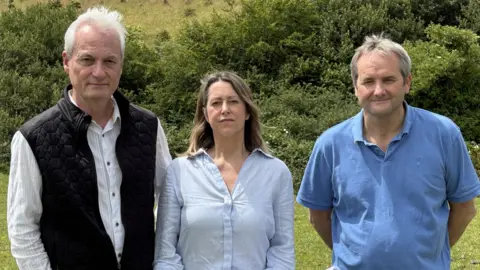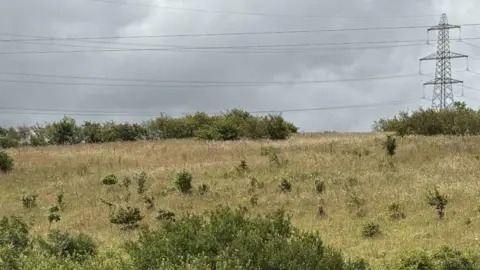Decision deferred on geothermal energy plant plans
 BBC
BBCMore information about potential environmental impact is needed before a decision can be made on whether a new geothermal energy plant should be permitted in north Cornwall, councillors have said.
Cornwall Council has deferred its decision on whether plans to drill into hot rocks under land in Slaughterbridge near Camelford should go ahead.
People living near the site fear harmful minerals and fluids brought up during the extraction process could run off and pollute water in a tributary of the River Camel.
Geothermal Engineering Limited, the firm behind the plans, has denied there would be pollution and said any impact on the environment would be mitigated.
Landowner Andrew MacLeod said the plant's location near a tributary of the River Camel was "ridiculous".
"I believe the water will be polluted," he said. Geothermal water, because of where it comes from, is laden with heavy metals, lithium, arsenic, and mercury."
David Stark, who lives near the proposed plant, said the location was wrong: "We're probably looking at three to five years of disruption, noise and pollution - and potentially seismic activity. This basically should not be happening here."
Another opponent, Sonia Parsons, added: "We're all in favour of eco-energy but it's a protected environment and we feel the risks are sufficient to say this shouldn't be going ahead."

Dr Ryan Law, CEO of Geothermal Engineering Limited, refuted the claims and said the plant would create dozens of jobs and generate around £2 million for the local economy.
"Tregath Geothermal will deliver up to 4.9MW of green, renewable baseload electricity to the National Grid and will be another step forward in reducing our dependency on fossil fuels," he said.
Both Cornwall Council and the Ministry of Housing, Communities, and Local Government have dismissed the need for an environmental impact assessment on the plans.
A report to the planning committee said the Environment Agency was satisfied that with "suitable planning conditions" there would be no "undue impacts on water interests, including ground water".
But The Environment Agency's response to the application added that if any contamination was identified at the site, the development should be halted until the developer had submitted a "remediation strategy".
'Industry could grow'
Geothermal energy is created by drilling deep into hot rocks underground to produce a source of heat or to power electricity generators.
A recent study by the British Geological Survey (BGS) highlighted the potential in Cornwall for geothermal resource.
Dr Alison Monaghan, head of geothermal energy research at the BGS, said: "For every kilometre you go underground in Cornwall the geothermal gradient is more like 35C (95F) per kilometre, whereas in other parts of Britain that might be more like 26C (79F) per kilometre."
She said this meant there were "aspirations" to develop more geothermal plants in Cornwall.
"You don't have to drill as deep as you do in other parts of the UK for the same or more amounts of energy, and obviously it costs money to drill. The conditions are there so the industry could grow in Cornwall," she added.
'More technical information'
At a meeting of the council's strategic planning committee, members voted 6-3 to delay a decision until more technical information had been gathered.
Committee member Martyn Alvey said members were not comfortable with the information they had and wanted it presented in a more understandable way.
He explained: "The applicants were keen to stress there would not be environmental damage, some of the residents are very concerned there could be.
"It's a very technical issue - but also a very important decision for Cornwall. Geothermal energy is certainly something that we would want to promote and encourage in Cornwall - but at the same time we need to do it safely."
A decision will now be made at a future meeting on a date to be fixed.
Follow BBC Cornwall on X, Facebook and Instagram. Send your story ideas to [email protected].
